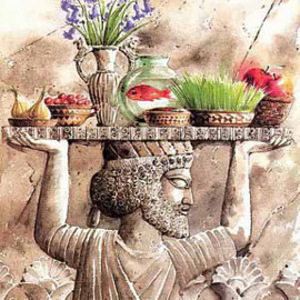50 signatures reached
To: President of Michigan State University
Add Nowruz to MSU work exemption/time off

My name is Parisa Ghaderi. I'm an Iranian visual artist, filmmaker, curator, and assistant professor of graphic design at the Department of Art, Art History and Design at Michigan State University. I moved to the US in 2009 and, since then, I have made work that reflects my experiences as an Iranian emigre.
For the past 12 years, I have witnessed my non-Iranian friends celebrating their holidays such as New Year, Christmas, and Thanksgiving away from work and with family and friends. But, unfortunately, that's not the case for Iranian students in the US, considering the hostile political relationship between Iran and the US that complicates visa applications and limits travel between the two countries.
There are many holidays that Iranian students miss celebrating with their loved ones—Nowruz is the most important. Nowruz, or "the first day of spring," is on March 21st. Still, unlike New Year's Day, the beginning of Nowruz's changes every year, ranging from early morning to past midnight (Nowruz's timing is based on the Solar Hijri algorithmic calendar).
This variability makes it difficult for Iranians living and studying in the US to celebrate Nowruz since there is no official time given off before, during, or after celebrating with friends and family, physically or virtually. At MSU, students and faculty have to abruptly reconvene their work duties, an often intense emotional burden that has been simply overlooked by academia.
My goal with this petition is to show Dr. Samuel L. Stanley Jr., President of MSU, that I am not alone in my effort to see community recognition of a day to celebrate Nowruz, the Persian "beginning of the spring," and exempt students and faculty from their expected duties during this holiday.
I truly would appreciate it if you sign my petition to make Nowruz a holiday for the Iranian community at Michigan State University.
For the past 12 years, I have witnessed my non-Iranian friends celebrating their holidays such as New Year, Christmas, and Thanksgiving away from work and with family and friends. But, unfortunately, that's not the case for Iranian students in the US, considering the hostile political relationship between Iran and the US that complicates visa applications and limits travel between the two countries.
There are many holidays that Iranian students miss celebrating with their loved ones—Nowruz is the most important. Nowruz, or "the first day of spring," is on March 21st. Still, unlike New Year's Day, the beginning of Nowruz's changes every year, ranging from early morning to past midnight (Nowruz's timing is based on the Solar Hijri algorithmic calendar).
This variability makes it difficult for Iranians living and studying in the US to celebrate Nowruz since there is no official time given off before, during, or after celebrating with friends and family, physically or virtually. At MSU, students and faculty have to abruptly reconvene their work duties, an often intense emotional burden that has been simply overlooked by academia.
My goal with this petition is to show Dr. Samuel L. Stanley Jr., President of MSU, that I am not alone in my effort to see community recognition of a day to celebrate Nowruz, the Persian "beginning of the spring," and exempt students and faculty from their expected duties during this holiday.
I truly would appreciate it if you sign my petition to make Nowruz a holiday for the Iranian community at Michigan State University.
Why is this important?
Over two hundred Iranian students and professors living and working at MSU are at the forefront of their research, contributing to science and the community through scholarship, activities, and crafting a better future. Given this number of Iranian students and scholars at Michigan State University, it is only fair that the university allows them to have the most important day in their culture recognized in the MSU community. Making Nowruz as an observing day/providing exemptions for two days of Nowruz celebration would both help recognize and embrace the importance of the Iranian community to MSU and serve as an example of inclusion by an institution that holds equity and diversity as its core value.
